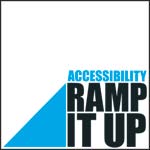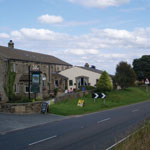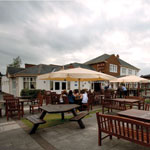Accessibility – Open to everyone?
Over a quarter of the UK population is burdened with a long-standing health problem or disability but many pubs and restaurants still fail to make the small changes required to capitalise. Elly Earls finds out about the simple steps pubs and restaurants can take to put themselves in the path of a £2b market
Making your business more accessible doesn't just mean widening doors, adding disabled toilets and installing ramps. Indeed, wheelchair users account for only a small proportion of the 27% of the UK population that currently suffers from a long-standing health problem or disability; this group also includes those with poor vision, hearing impairments, learning difficulties and older people who walk with a stick and might need a support rail to negotiate one or two steps.
Not only is this sector of the population - along with their friends, family and support teams - worth almost £2b per year just in overnight stays, the number of people in need of accessible facilities is growing year on year: by 2025, more than a third of the UK's population will be over the age of 55.
But many pubs and restaurants are failing to make the most of this opportunity.
"There's a lot more that they could be doing," says Ross Calladine, skills, welcome and accessibility manager at VisitEngland. "In particular, very few pubs and restaurants are giving information about their accessibility."
Neil Williams, spokesman for the British Beer & Pub Association (BBPA), agrees. "There is definitely a need to raise awareness across the hospitality sector and we wanted to play our part in helping that along," he says.
In response, the BBPA has created a user-friendly guide to help pubs welcome those with access needs. "This was produced with our help to start engaging pubs in an area they might not have considered before," Calladine explains, adding that it covers the three pillars any hospitality business needs to take into account if they are to effectively improve their accessibility credentials.
Information comes first, and this is often in the form of an access statement, which is defined by VisitEngland as "a description of a business's facilities and services to inform people with access needs".
"Everyone can give information on their accessibility, whether it's good or bad," Calladine notes. "And it means that anyone who has any type of access requirement can read that information and decide whether the venue is suitable for them to visit."
According to Brian Seaman, head of consultancy for Tourism For All, hospitality businesses have improved in this area in recent years. "Companies are really starting to demonstrate what they can do in terms of providing better information," he says. "Websites are very important in this; unless you have the information up front, how do you know what to expect?"
Customer service is the second pillar of an effective accessibility strategy and, for Calladine, this is really about giving the staff the confidence to serve and assist people with access needs. "Sometimes, staff members are worried about saying the wrong thing and offending people," he notes. VisitEngland's online disability training tool therefore includes a module on language, as well as a section dedicated to raising awareness about the different types of disabilities and advice on what you can do to help people with access needs.
Another effective way of improving your customer service is to simply go out there and talk to disabled people. "Training doesn't necessarily have to be complex or expensive," Seaman believes. "By talking to a local access group you can find out a lot about people's needs and how to meet them."
And the final, and most obvious, way to improve your business's suitability for those with access needs is by upgrading your facilities. While many presume that this means fitting a lift or investing in disabled toilet facilities, there are actually lots of smaller things businesses can do that are equally effective.
"One step could be enough of a barrier to prevent people getting into a venue, so think about providing a portable temporary ramp," Calladine advises. "Also, make sure there's a clear route to get to the bar and the toilets. These things are relatively simple to do and don't require much, if any, money."
Accessibility Awareness Day
We will be encouraging all hospitality businesses to take part to see how they can make a difference, both to the impression they give to those with disabilities and to their bottom line. In the coming weeks we will offer practical advice on getting staff involved - with suggestions such as taking a tour of your operation in a wheelchair to understand the limitations - ideas for running accessibility-awareness sessions, and guides for ensuring you get the most out of your efforts.
So put the date in your diary, enthuse your teams and look out for the Ramp It Up logo in the coming weeks for more advice on how to participate.
Access Statements
VisitEngland requires any business that is part of the quality assessment schemes for accommodation and attractions to have an access statement, and since December 2010 has been taking operators through the four simple steps necessary to produce this document with its free online tool, which can be found at www.visitengland.org/accessstatements.
Among other things, the tool offers advice on what to include in your access statement; this could be information on local car parking facilities, the number of bedrooms and bathrooms you have that are suitable for people with access needs or details of any local accessible taxi services.
On top of this, bespoke templates for pubs and restaurants have been added to the website in recent months, and while this has meant that more and more operators have started to get on board with producing access statements, many are still failing to promote their accessibility credentials and are therefore missing out on a valuable marketing opportunity.
Practical ways to make your business more accessible
â- Upgrading your facilities doesn't have to be a cripplingly costly exercise. While installing disabled toilets and lifts is a great move if you can afford it, there are also lots of little things you can change about your business, which are equally effective. This could include fitting centrally-placed handrails wherever you have steps, ensuring you have a mix of chairs with and without armrests and making sure there's a clear route for people in wheelchairs to get to the bar and toilets.
â- Remember that tourism businesses have obligations under the Equality Act of 2010. Not only are businesses prohibited from treating someone less favourably because of a disability or because of something connected with a disability, they must also make "reasonable adjustments" to their policies and facilities to meet the needs of disabled people. This is based on many different factors including the size and turnover of the business, and is by no means black and white, but could involve anything from providing a temporary ramp to the front door to allowing assistance dogs into the premises. If you're unsure about what this means for your business, seek further advice from VisitEngland or the BBPA.
â- Training is an absolutely crucial part of making your business suitable for those with access needs and can include things as simple as reminding your staff to note down next to a booking that the customer has access needs. That way, the table can be prepared ahead of time and you won't have to worry about drawing attention to the customer by moving chairs and tables around when they arrive.
Responding to customer demand
So, in response to customer demand, Kempster and his team introduced wet-room bathrooms with seats and grab rails, widened the doors and installed ramps to make the venue accessible to anyone in a wheelchair.
But the most important part of becoming more accessible, for Kempster, has been training his staff in how to deal with disabled customers. "We don't want the staff to ignore disabled people and end up just talking to their carers or the people with them," he explains. "We also make sure staff have tables ready in advance for customers with access needs. There's nothing worse than taking a customer in a wheelchair to a table with chairs, as it draws attention to them."
Since introducing more facilities for people with access needs and ensuring staff are trained up to deal with them, Kempster has seen a huge improvement to his business. "We have disabled people in every single day now," he remarks.
Taking accessibility seriously
"Some operators have buried their heads in the sand in the past, but that's just not what we've done," says Neil Pollard, area building manager for the North-west.
Now, he estimates that 98% of the company's venues have disabled toilets, and emphasises that in each and every site managed by Mitchells & Butlers, absolutely everything possible has been done to accommodate customers with access needs.
For example, at the Black Bull in Fullwood, Lancashire (pictured), an Ember pub, the entire site is fully accessible, following alterations to remove the original raised areas, while at O'Neill's in Preston, the company decided to install a disabled toilet, which can be accessed with a ramp, despite the small pub's town centre setting and the restrictions that come with its location.
"The only places we haven't done anything is where we've been totally restricted with planning, such as listed buildings," Pollard notes.
And it's not just the obvious facilities that Mitchells & Butlers is committed to getting right. O'Neills also has bespoke bar runners with simple sign language that allow staff to communicate with and understand deaf customers when they're ordering.









